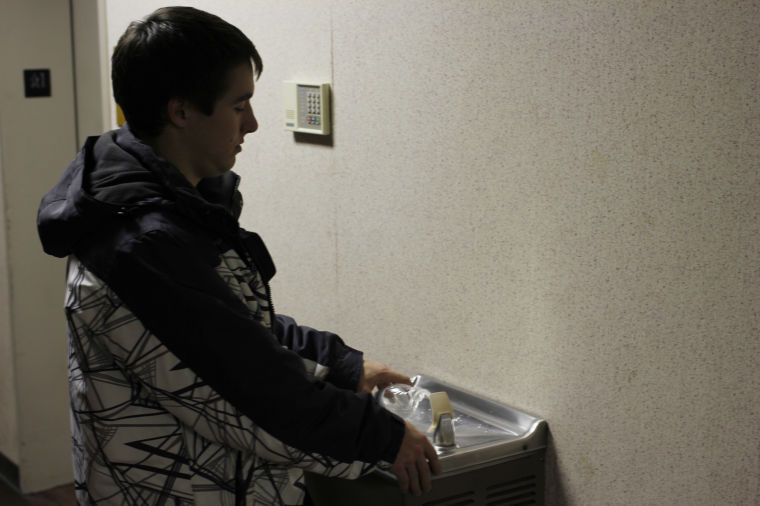DeKalb water passes IEPA regulations
Will Wilson, senior pre-physical therapy major, refills his water bottle from a water fountain in February 2013.
February 6, 2013
DeKalb’s drinking water is safe and meets all Illinois Environmental Protection Agency (IEPA) regulations, regardless of student speculation otherwise, according to reports published by the agency.
Questions about the contents and possible contaminants in DeKalb drinking water have been circulating through campus for years, but according to Bryan Faivre, assistant director of DeKalb Public Works Water Resources, residents have nothing to worry about. DeKalb water is so free of contaminants the differences between bottled water and city water are negligible, according to T.J. Moore, director of DeKalb Public Works.
“The City of DeKalb’s water supply meets or surpasses all State and Federal EPA rules, regulations and guidelines,” Faivre said. “We perform a wide variety of tests daily on the water supply to ensure its safety and quality.”
Regardless of these facts, fears of unsafe DeKalb drinking water plague the student body.
“I’ve heard from several people that the water is horrible and that it isn’t safe to drink,” said Chontol Cannon, junior communications major. “I don’t necessarily believe that it’s unhealthy, I mean, who really believes anything [people] say these days? But I can say that [I] will not drink the water here just to be on the safe side.”
Faivre explained that these rumors may still be a result of EPA reports from the 1990s which showed DeKalb drinking water had a radium content above what regulations allow. Faivre said radium, a naturally occuring element, was a newly regulated contaminant by the EPA at the time.
“At the time the water was above the standard, there may have been some justification for concern.” Faivre said. “The City of DeKalb has been in full compliance with the radium standard though for the past 13 years, so there shouldn’t be the concern that may have existed prior to that.”
After DeKalb failed to meet EPA standards, new treatment plants were built.
“The EPA helped, and there were loans that were given to the city to pay for the development of a new water system,” Moore said. “So, new wells and new treatment plants were developed all over the city and now we are well within all of the EPA thresholds.”
In order to meet EPA requirements, DeKalb’s water must go through an intensive filtration process.
“The treatment plants are ion exchange softening plants with iron removal filters,” Faivre said. “Through the softening process, the radium is removed to levels below the allowable limit by the EPA.”
A community water system that delivers water to at least 25 residents must distribute a consumer confidence report by July 1 of each year. The consumer confidence report is a direct effect of the 1996 Safe Drinking Water Act, and contains information about the community’s drinking water and the levels of contaminants.
Faivre and Moore said filtering your water at home isn’t necessary for your health, and that the main effect of filtering your own water is for flavor.
Moore encourages residents to use reusable plastic bottles as opposed to disposable, because in many cases bottled water is the same or nearly the same product as DeKalb water.
For more information regarding the City of DeKalb Water Resources visit: http://www.cityofdekalb.com/PW/Water/WaterResources.htm







